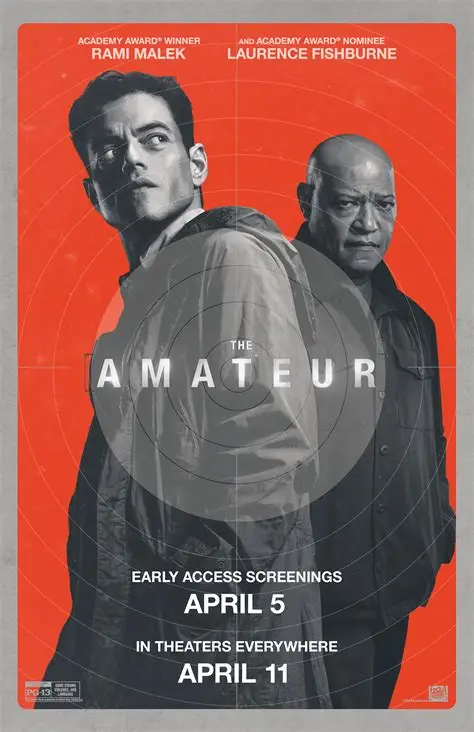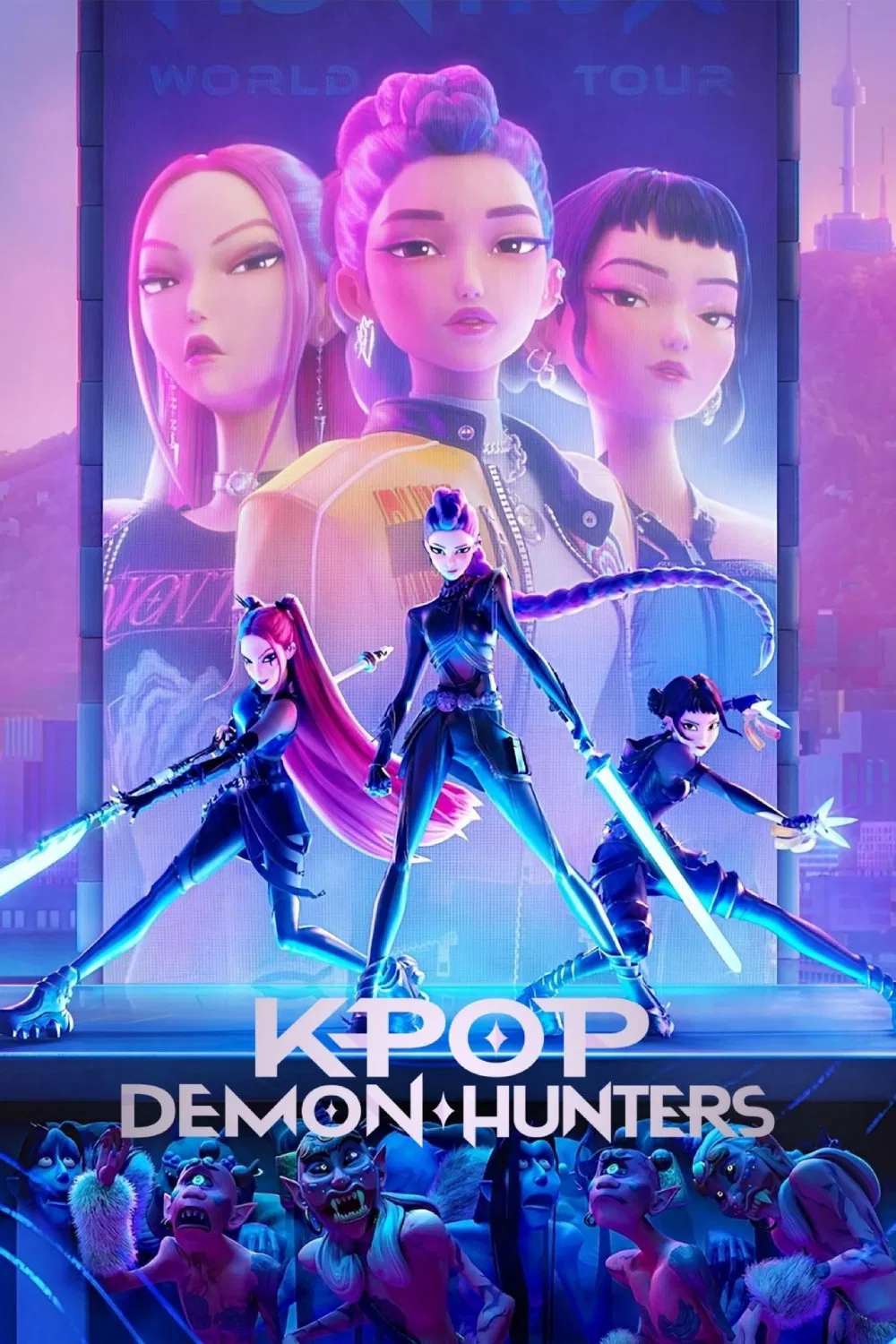
KPop Demon Hunters (2025)
KPop Demon Hunters (2025) is one of the most anticipated animated musical action features of the year, blending K-pop, supernatural fantasy, urban adventure, and musical spectacle. Directed by Maggie Kang and Chris Appelhans, and starring voice talents such as Arden Cho, May Hong, and Ji-young Yoo, this English-language film is scheduled for release on Netflix on June 20, 2025.
Movie Overview
KPop Demon Hunters is an exhilarating animated musical fantasy that centers on HUNTR/X, a popular K-pop girl group—Rumi, Mira, and Zoey—who secretly double as demon hunters defending human society from supernatural threats. Their greatest antagonists are the Saja Boys, a rival boy band made up of demons in disguise. As they battle dark forces with electrifying performances and catchy pop tunes, themes of identity, family, and community unfold through visually stunning animation influenced by K-pop aesthetics and music-video style visuals. :contentReference[oaicite:0]{index=0}
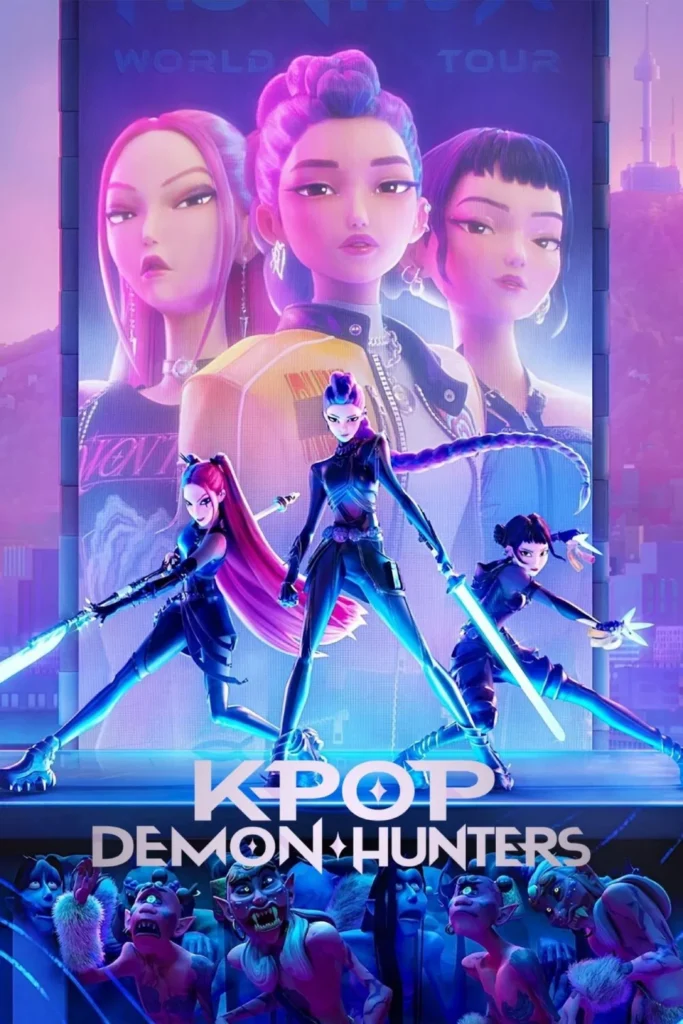
Attribute Details
- Title: KPop Demon Hunters
- Genre: Animated musical, action, fantasy, urban adventure, K-pop musical
- Language: English
- Release Date: June 20, 2025 (Netflix), August 23–24, 2025 (limited sing-along theatrical) :contentReference[oaicite:1]{index=1}
- Director: Maggie Kang, Chris Appelhans :contentReference[oaicite:2]{index=2}
- Writer: Danya Jimenez, Hannah McMechan, Maggie Kang, Chris Appelhans :contentReference[oaicite:3]{index=3}
Production and Creative Vision
Produced by Sony Pictures Animation and distributed by Netflix, the film blends 2D/3D hybrid animation inspired by concert lighting, editorial photography, K-drama, and anime aesthetics—created by Sony Pictures Imageworks :contentReference[oaicite:4]{index=4}. The screenplay, a collaborative effort by Maggie Kang, Chris Appelhans, Danya Jimenez, and Hannah McMechan, brings to life a bold and culturally rooted story with original music and hypnotic choreography :contentReference[oaicite:5]{index=5}. The musical score was composed by Marcelo Zarvos. :contentReference[oaicite:6]{index=6}
Voice Cast and Characters
Key voice performances include Arden Cho as Rumi, May Hong as Mira, Ji-young Yoo as Zoey, supported by Ahn Hyo-seop, Yunjin Kim, Daniel Dae Kim, Ken Jeong, and Lee Byung-hun—who voices the villain Gwi-Ma :contentReference[oaicite:7]{index=7}. The charismatic trio HUNTR/X balance dazzling stage presence with badass demon-hunting prowess, while the Saja Boys serve as the sinister rival boy band. :contentReference[oaicite:8]{index=8}
Animation Style and Visual Appeal
The animation features a distinctive visual identity with hyper-stylized character designs and camera work inspired by K-pop music videos and concert lighting. Characters fluidly shift between glamorous performance personas and bold demon-hunter action forms. Animators aimed to authentically represent Korean facial expressions—like mouth and eye movement—even in English voice performances :contentReference[oaicite:9]{index=9}. The look combines vibrant color palettes, dynamic movement, and moments of super-cute chibi exaggeration for comedic effect. :contentReference[oaicite:10]{index=10}
Soundtrack Success
The original soundtrack, released by Republic Records on June 20, 2025, includes the singles “Golden” by HUNTR/X and “Your Idol” by the Saja Boys :contentReference[oaicite:11]{index=11}. “Golden” soared to No. 1 on the Billboard Global 200 and topped charts in over 14 countries :contentReference[oaicite:12]{index=12}. “Your Idol” became the first K-pop boy band track to top the U.S. Spotify chart :contentReference[oaicite:13]{index=13}. Other standout tracks like “Soda Pop” cleverly contrast bubblegum pop hooks with sinister lyrical undertones, reflecting the manipulative tendencies of the Saja Boys :contentReference[oaicite:14]{index=14}.
Global Reception and Cultural Impact
Since its Netflix debut on June 20, 2025, KPop Demon Hunters has become the platform’s most-watched animated original, with over 158 million streams in its first 45 days and 180 million+ worldwide to date :contentReference[oaicite:15]{index=15}. Critics and fans praised its musical and visual energy, with Rotten Tomatoes rating it at 97% based on 67 reviews :contentReference[oaicite:16]{index=16}. Its cultural resonance has amplified global interest in K-pop and symbolism tied to identity, community, and empowerment :contentReference[oaicite:17]{index=17}.
Theatrical Sing-Along Event and Box Office Triumph
In an unprecedented step for Netflix, the film saw a limited theatrical sing-along release on August 23–24, 2025, across 1,750 theaters worldwide. The immersive event garnered an estimated $16–20 million in box office revenue, marking Netflix’s first No. 1 box-office title :contentReference[oaicite:18]{index=18}.
Director’s Vision and Sequel Potential
In interviews, director Maggie Kang revealed that much of the characters’ backstories—like how they became demon hunters—was left out of the film due to runtime constraints. She has expressed openness to a sequel that could further explore character origins and emotional arcs :contentReference[oaicite:19]{index=19}. Leaked concept art hints at deeper family-level drama, such as Rumi’s aunt Celine’s accidental role in her mother’s death—a storyline fans hope will be addressed in future installments :contentReference[oaicite:20]{index=20}.
Critical Acclaim
Reviewers lauded the film’s high-octane animation that looks and feels like a continuous music video, as well as its earworm soundtrack. Comments ranged from “jaunty family entertainment” to “visually stunning storytelling,” with many noting its ability to engage both genre enthusiasts and casual viewers alike :contentReference[oaicite:21]{index=21}.
Social Commentary and Thematic Depth
At its emotional core, the film tackles themes of identity and duality. Rumi, who is part-demon by birth, struggles with societal and familial pressures before embracing her true self through music and fight. Maggie Kang notes that Rumi’s journey parallels experiences of coming out, navigating expectations that clash with personal truth. The final song, “What It Sounds Like,” underscores this journey from hidden struggle to triumphant authenticity :contentReference[oaicite:22]{index=22}.
The Unique Concept of KPop Demon Hunters
One of the biggest talking points around KPop Demon Hunters (2025) is its refreshingly unique concept that blends South Korea’s globally adored K-pop culture with supernatural action and fantasy elements. Unlike typical K-pop dramas or idol-focused films, this movie dives into an alternate world where idols are not just performers on stage but also fierce protectors battling demonic forces. The concept instantly appeals to both K-pop fans and moviegoers who enjoy high-energy action and thrilling fantasy storylines, making it a genre-defying title with crossover appeal.
The Setting and Visual World
The film sets its story in a dazzling yet dangerous modern Seoul, where glamorous stages and neon lights mask the presence of sinister demonic threats. This vibrant backdrop allows the film to showcase the duality of the K-pop world: glitzy performances on one side and high-stakes demon hunting on the other. Director Maggie Kang ensures the visuals remain larger than life, with spectacular choreography scenes balanced against epic battles that feel like they’re ripped straight out of a comic book. Audiences can expect a mix of sleek K-pop stage aesthetics and shadowy fantasy landscapes, making the film visually unforgettable.
The Role of the All-Female Idol Group
At the heart of the film is an all-female K-pop idol group who are secretly demon hunters. This dynamic not only highlights themes of empowerment and sisterhood but also celebrates the determination of young women striving to protect their fans and community from supernatural danger. Each member of the group brings her own strengths and personality, making the team relatable while also embodying the larger-than-life qualities of idol superheroes. This ensemble approach allows audiences to connect with multiple characters rather than focusing solely on a single protagonist.
Exploring Themes of Fame and Responsibility
A recurring theme in KPop Demon Hunters (2025) is the tension between fame and responsibility. While the idol group enjoys stardom, adoration, and success, they are also burdened with the responsibility of saving the world from evil. The film cleverly explores how these two aspects of their lives collide—performing on stage to millions of fans one night and fighting demonic invasions the next. This dual existence mirrors real-life pressures faced by K-pop idols, where behind the glamour lies a world of intense effort, sacrifice, and duty.
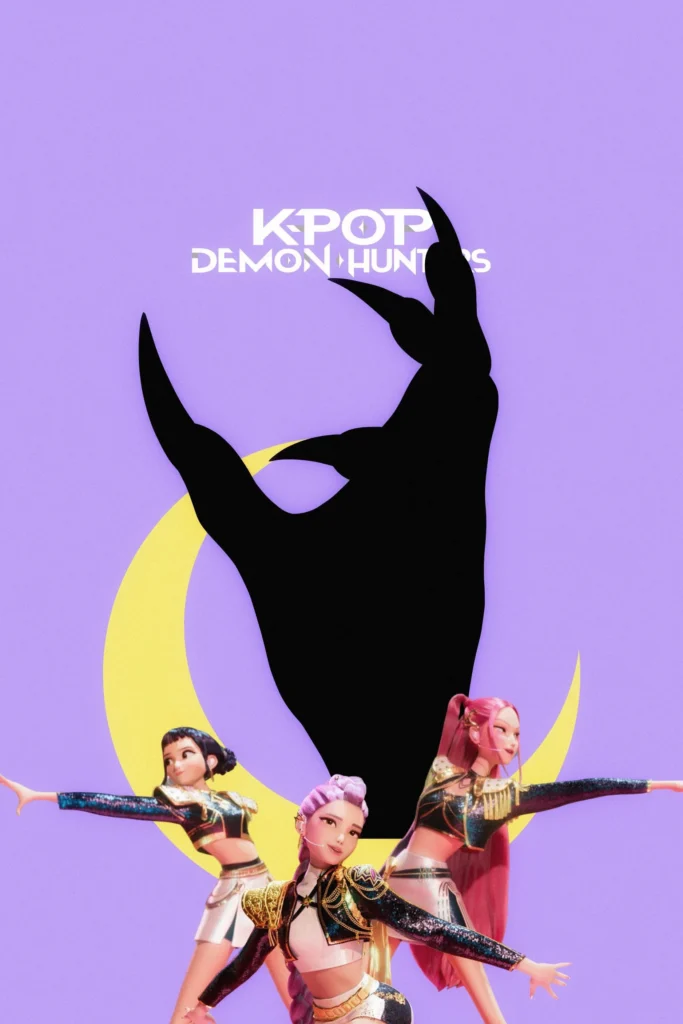
Choreography as Both Art and Combat
K-pop is known worldwide for its powerful choreography, and this film takes it a step further by transforming dance into a weapon. The battle scenes incorporate choreographed combat moves that mirror iconic K-pop dance routines, blending art with action in a way that has never been seen before. These sequences symbolize how music, rhythm, and performance can be empowering tools, allowing the heroines to defeat evil through the very talent that made them stars. It’s a creative touch that reinforces the theme of art as strength.
Star Power and Casting Highlights
Casting plays a pivotal role in the film’s appeal. While the official lineup of actresses portraying the idol-demon hunters remains under wraps, reports suggest the producers have sought both established K-pop idols and rising acting talents to ensure authenticity. By featuring real performers familiar with choreography and stage presence, the film guarantees believable and electrifying performances. The casting choices alone are generating speculation and hype, as fans imagine their favorite idols taking on the mantle of demon hunters in this groundbreaking production.
The Director’s Vision
Maggie Kang, who brings a wealth of creative experience to the project, has been vocal about her passion for blending cultural storytelling with mainstream entertainment. Known for her work in animation and storytelling, Kang aims to bridge East and West by showcasing K-pop in a format that appeals to global audiences. Her direction promises a balance of heartfelt drama, thrilling fantasy, and visually stunning musical performances. This vision positions KPop Demon Hunters (2025) as a film that could redefine cross-genre cinema.
A Fusion of Music and Fantasy Cinema
Another remarkable aspect of the movie is its soundtrack. With K-pop being central to the film’s identity, music is not just a background feature but a driving force of the story. Original tracks are being produced for the film, ensuring that each performance resonates emotionally while also tying into the larger battle sequences. This fusion of fantasy storytelling with fresh K-pop music ensures the film has not only cinematic but also musical appeal, potentially leading to chart-topping soundtracks and viral dance challenges upon release.
Appeal to International Audiences
The global reach of K-pop ensures that KPop Demon Hunters (2025) will not just be limited to Korean or Asian audiences. With millions of fans across North America, Europe, Latin America, and beyond, the film is poised to become an international hit. Subtitled and dubbed releases are already being discussed, and the storyline’s universal themes of courage, friendship, and empowerment make it relatable across cultures. Combined with the ongoing K-pop wave, the movie has the potential to be one of the most internationally successful Korean fantasy films ever made.
Breaking Stereotypes in Cinema
Perhaps one of the most important achievements of this movie is how it breaks stereotypes. It challenges outdated notions about female-led action films, K-pop idols, and even genre boundaries. By presenting idols as capable warriors and leaders, it inspires fans with strong, multidimensional female characters who can be both glamorous performers and courageous fighters. This blend of strength and elegance sends a powerful message about women’s roles in entertainment and society, making KPop Demon Hunters (2025) more than just a film—it becomes a cultural milestone.
The Global Hallyu Wave and KPop Demon Hunters
The rise of the Hallyu wave has been one of the most influential cultural phenomena of the 21st century, and KPop Demon Hunters perfectly capitalizes on this momentum. By blending K-pop with fantasy action, the film becomes a natural extension of South Korea’s cultural export power. With K-pop concerts selling out globally and streaming platforms showcasing Korean dramas, the film’s release is perfectly timed to ride the global K-wave. Fans worldwide are eager to see how their favorite music culture translates into a supernatural action story.
The Fashion and Styling of Idols in KPop Demon Hunters
Fashion plays a critical role in the appeal of KPop Demon Hunters. Each character’s styling reflects both their idol persona and their demon hunter identity. Expect dazzling stage costumes dripping with sequins and color, but also darker, combat-ready outfits designed for action sequences. These contrasting styles highlight the duality of the characters’ lives, while also providing fans with iconic looks to emulate. The fashion in the movie is anticipated to spark trends across the K-pop community and beyond.
Behind the Scenes Production Journey
The production of KPop Demon Hunters has been a fascinating journey involving both Korean and international talent. Producers have invested heavily in cutting-edge special effects to ensure the supernatural battles feel authentic, while also consulting with K-pop choreographers to design stage performances that rival real concerts. This blend of technical precision and cultural authenticity ensures that the movie feels fresh, exciting, and true to the essence of K-pop culture.
The Soundtrack: Music as a Weapon
In KPop Demon Hunters, the soundtrack is not just background noise—it’s an integral storytelling tool. Songs written specifically for the film play key roles in both the narrative and battle sequences. Some tracks are upbeat and designed for high-energy performances, while others are darker, matching the tone of demon hunting. The anticipation surrounding the soundtrack is already enormous, with fans expecting it to produce hit singles and viral dances that will further spread the film’s popularity globally.
The Role of Sisterhood and Unity
One of the emotional pillars of KPop Demon Hunters is its emphasis on sisterhood and unity. The idol group’s success depends not only on their individual talents but on their ability to work together—both on stage and in battle. This message resonates strongly with fans, many of whom look to idol groups as examples of friendship, resilience, and teamwork. By portraying these bonds as essential to defeating evil, the film creates a heartfelt story about the strength of unity.
The Director’s Vision for KPop Demon Hunters
Director Maggie Kang has expressed her commitment to making KPop Demon Hunters a cinematic experience unlike anything audiences have seen before. Her vision combines the glamour of idol culture with the adrenaline of fantasy storytelling. By carefully balancing music, choreography, and epic battles, Kang ensures the movie appeals to diverse audiences. Her approach reflects an understanding of both K-pop fandom and mainstream cinema, making her the perfect choice to lead the project.
International Marketing Strategies
The marketing campaign for KPop Demon Hunters is expected to be global in scope. From teaser trailers on YouTube to TikTok dance challenges inspired by the film’s choreography, the campaign is designed to reach millions of fans. Additionally, partnerships with K-pop agencies and international streaming platforms will help the film gain traction worldwide. This innovative strategy ensures that the film is not only seen as a Korean production but as a truly international blockbuster.
Representation of Female Empowerment
KPop Demon Hunters breaks away from traditional portrayals of female characters by placing women at the center of the story. The idols are not damsels in distress but powerful fighters who take control of their own destiny. This representation of empowerment is important both for fans who look up to K-pop idols and for a broader audience that craves strong female-led narratives. By intertwining glamour and grit, the film inspires viewers with its message of courage and independence.
Action Sequences with a Musical Twist
One of the most innovative elements of KPop Demon Hunters is its integration of music into action scenes. Rather than separating performances from battles, the film merges the two. Demon fights are choreographed like dance routines, with every kick, punch, and flip aligning to the rhythm of the music. This musical twist on traditional action elevates the entertainment factor and creates sequences that are both visually stunning and emotionally charged.
Special Effects and Cinematic Technology
The production team behind KPop Demon Hunters is sparing no expense when it comes to special effects. From glowing demon designs to energy-infused dance battles, the film relies heavily on advanced CGI and motion capture technology. This ensures that every scene feels immersive and believable, while also amplifying the fantastical elements of the story. Audiences can expect a dazzling spectacle that combines the best of Hollywood action with K-pop’s colorful energy.
Global Fan Anticipation for KPop Demon Hunters
Fans worldwide are eagerly awaiting the release of KPop Demon Hunters. Online forums, fan groups, and social media platforms are already buzzing with speculation about the cast, soundtrack, and potential storyline twists. The film is not just a movie—it has become a global event for K-pop lovers. Anticipation is particularly high in regions like North America, Latin America, and Southeast Asia, where K-pop has massive fanbases. The hype alone ensures that the movie will be one of the most talked-about releases of 2025.
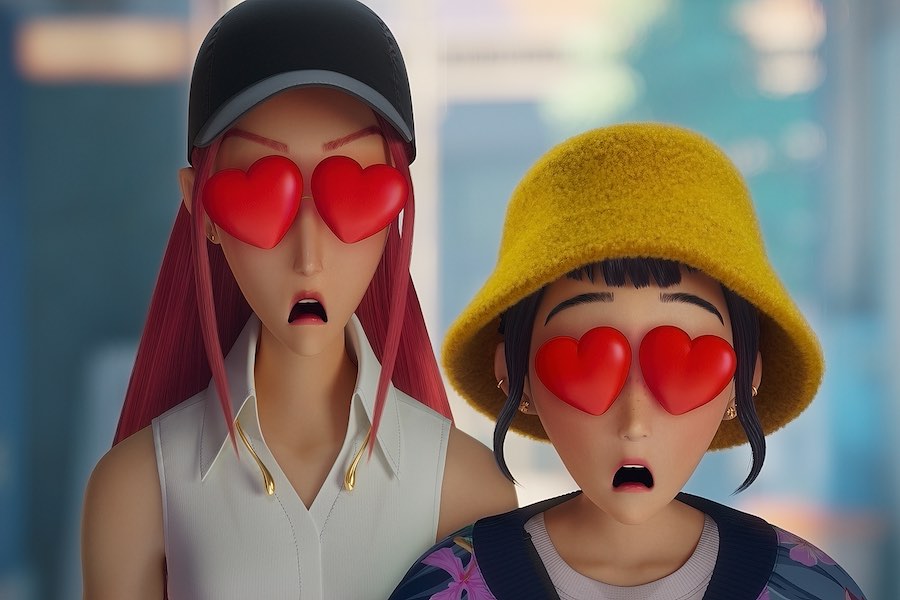
The Role of Korean Mythology in the Film
While KPop Demon Hunters incorporates modern idol culture, it also draws heavily from Korean mythology. Demons, spirits, and supernatural beings from Korean folklore serve as the antagonists, grounding the film in cultural authenticity. This infusion of mythological storytelling makes the movie more than just a fantasy flick—it becomes an exploration of Korean heritage told through a modern, globally appealing lens.
The Potential for a Franchise
Given its ambitious concept and wide appeal, many fans and critics believe KPop Demon Hunters could be the start of a new franchise. Spin-offs, sequels, and even a possible television adaptation are already being speculated about. With the potential to expand its universe, the film could pave the way for an entirely new genre of idol-fantasy cinema, opening the door to countless storytelling possibilities.
The Importance of Diversity in Storytelling
KPop Demon Hunters is more than just entertainment—it’s a step toward greater diversity in storytelling. By centering Korean culture, K-pop idols, and female heroes, the film highlights perspectives that are often underrepresented in mainstream cinema. This diversity not only enriches the global film industry but also resonates with fans who crave fresh, inclusive narratives that reflect the world around them.
KPop Demon Hunters as a Cultural Milestone
In many ways, KPop Demon Hunters represents a cultural milestone. It merges two powerful forces—K-pop and cinema—into a singular experience that celebrates music, identity, and heroism. More than just a movie, it’s a cultural statement about the global impact of Korean entertainment. By blending fantasy with the universal language of music, it leaves a lasting impression as a groundbreaking project that redefines what international cinema can achieve.



